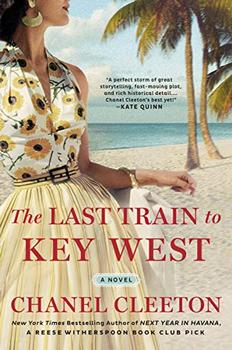Summary | Excerpt | Reading Guide | Reviews | Beyond the Book | Readalikes | Genres & Themes | Author Bio

 Book Reviewed by:
Book Reviewed by:
BookBrowse First Impression Reviewers
Buy This Book
As the "Southernmost City," Key West is the end of the road, the farthest you can venture in the United States before your feet meet water. Such a distinction brings all manner of people: wanderers, criminals, people wanting to get lost, people wanting to get found, as though anything is possible down here at the edge of the world-for most of us anyway. It used to be, you had to have a boat to get here, but now there's the railroad that runs over the ocean, connecting the little islands that make up the Keys to the mainland and Miami, the total journey spanning over one hundred and fifty miles and a few hours' time, an ambition Mr. Henry Flagler-one of the richest men in the country when he was alive-was ridiculed for when he announced the project decades ago. But Mr. Flagler pressed on, and the railroad was built, bringing jobs to people like my father-native Conchs-and men who came down to the Keys searching for work who laid the tracks for the Key West Extension with their bare hands.
The railroad's one of the greatest things man's ever built, Daddy would say. Can you imagine? Flying over the ocean in one of those big machines?
I couldn't.
What sort of men dreamed of building things like floating railroads? What sort of people rode in them?
Daddy told me there were two kinds of people in this world:
The people who built things with their own two hands, and the kind of people who enjoyed the things others built. But then the Depression came, proving to be the great equalizer.
A long time ago, before I was born, Key West was the largest and wealthiest city in Florida. But even before the rest of the country felt the effects of the crash in '29, Florida struggled. Money and credit ran out, and problems have plagued the citrus crop. Now, people are out of work, hungry, and desperate, the city bankrupt, our fortunes anything but certain, thousands moving north with the hope of a better life.
There's some help from the government, which I suppose is better than no help, but it's never quite enough. They're trying to fix up the city, shipping veterans from the Great War down to the Keys to work on a new piece of highway linking Grassy Key and Lower Matecumbe.
At the corner of Trumbo Road and Caroline Street, I pass the railroad station as I have nearly every day for the past nine years. Beyond it lie the new docks. The Florida East Coast Car Ferry Company offers daily service to and from Havana, Cuba. They load dozens of freight cars onto the boats, taking them, cars, and passengers across the sea. Flagler's vision of connecting New York City to Havana is made possible by a few days of travel on his railroad plus several hours' ferry journey from Key West.
The familiar worn sign comes into view when I arrive in the parking lot of Ruby's.
Our proximity to the railroad station and the ferry terminal inspires visitors, the locals attracted by the possibility to gawk at the newcomers and take advantage of Ruby's low prices. Ruby doesn't hold much with pretensions, and it shows, the decor simple, the food hearty. It's the sort of place whose measure you take as soon as you walk through the doors, a restaurant that relies more on the food to recommend itself than the atmosphere.
We keep a steady pace of customers from the moment I arrive to midday, and I move from table to table, an ache settling in my back, the baby pressing down low. In the free moments when I'm able to sneak a break, I stand in the rear of the restaurant, leaning against the wall to relieve some of the pressure. The smells coming from the kitchen are nearly too much for my stomach, but at this point in the pregnancy, I'm so eager to take some weight off my feet it hardly matters.
The front door opens with a loud clang of the overhead bell, an awkward crash, the flimsy wooden structure no match for the large man whose hand rests on the handle. Heads turn, the noise rising above the sounds of the kitchen, the diners' conversations. The newcomer's cheeks redden slightly as he ambles through the door and gently guides it closed behind him.
Excerpted from The Last Train to Key West by Chanel Cleeton. Copyright © 2020 by Chanel Cleeton. All rights reserved. No part of this excerpt may be reproduced or reprinted without permission in writing from the publisher.





The Flower Sisters
by Michelle Collins Anderson
From the new Fannie Flagg of the Ozarks, a richly-woven story of family, forgiveness, and reinvention.

The House on Biscayne Bay
by Chanel Cleeton
As death stalks a gothic mansion in Miami, the lives of two women intertwine as the past and present collide.

The Funeral Cryer by Wenyan Lu
Debut novelist Wenyan Lu brings us this witty yet profound story about one woman's midlife reawakening in contemporary rural China.
Your guide toexceptional books
BookBrowse seeks out and recommends the best in contemporary fiction and nonfiction—books that not only engage and entertain but also deepen our understanding of ourselves and the world around us.